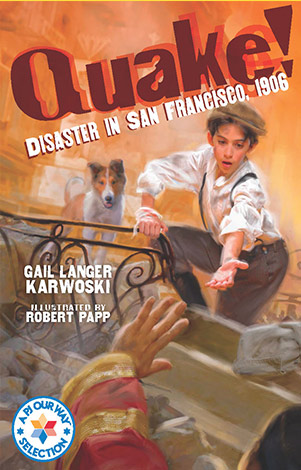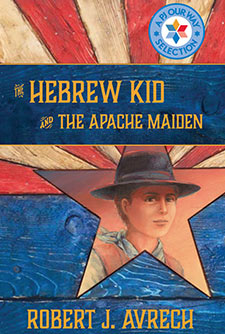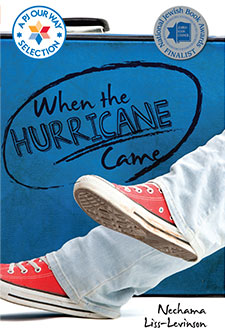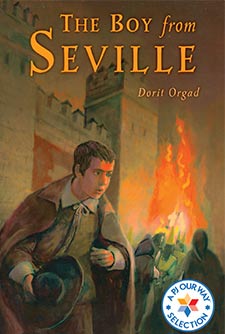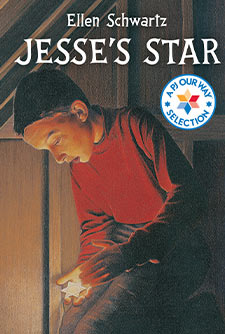Quake! Disaster in San Francisco, 1906
The stray dog that Jacob finds may look like an ordinary street mutt, but he's actually a hero who saves Jacob's life! Will Jacob have to give him up?
Average Rating
( hint: Login to leave a review! )
17 Reviews
Leave Review
What the Book is About
Jewish Content & Values
Positive Role Models
Content Advisory
Talk it Over!
More for You
What the Book is About
Life has been difficult for Jacob Kaufman in the past four months since his mother died. His father, Itzak, is mourning; his little sister Sophie, is often inconsolable; and the family lives in desperately poor conditions in San Francisco. When Jacob tries to adopt a little street dog, Itzak refuses to let it stay. Just when Jacob can’t imagine things getting any worse, he finds himself at the epicenter of the worst earthquake to ever hit San Francisco, the “Great Earthquake of 1906.” What ensues is the suspenseful story of how Jacob and his dog, Quake, traverse the rubble of the city in an effort to reunite with Itzak and Sophie. Along the way they befriend a Chinese boy named San and see both the ugly face of prejudice and the beauty of people who offer true kindness to others.
Jewish Content & Values
- Chesed (kindness): Quake! gives an honest picture of the variety of human reactions to tradegy, including a portrait of people who naturally show kindness to people in need. The wealthy Mrs. Merrill immediately opens her mansion to house and feed the homeless. And despite the fact that they barely have enough food or space for themselves and their children, Kevin and Annie Flanagan welcome San, Jacob, and Quake into their camp as though they were family.
- Pikuach Nefesh (preservation of human life): Jacob has always kept kosher, but when food is scarce after the earthquake he decides that he will eat whatever food he can find in order to stay alive. He understands that this reflects the Jewish principle of preserving and saving one's own life and the lives of the others even if it means going against mitzvoh (commandments) in the process.
- Hakarat Hatov (gratitude): Jacob feels grateful to both Quake and San for helping him survive the earthquake. Although he is afraid of what his father might think, he refuses to abandon his friends.
Positive Role Models
- Jacob: The earthquake and its aftermath force Jacob to grow up fast. While trying to find his family, he befriends San and realizes the terrible prejudice Asian Americans are forced to contend with. Unable to find his father and sister, Jacob realizes how much he misses them, and through that process he begins to come to terms with his mother's death.
- San: San is extremely loyal, well-mannered, and gracious. He faces the prejudice directed at him with courage and self-respect, and works very had to do what is right.
- Kevin and Annie Flanagan: Kevin and Annie are tolerant and kind people who accept San and Jacob into their temporary home with openness and warmth.
Content Advisory
The following could be emotionally difficult:
- The Great Earthquake of 1906 was one of the worst natural disasters in U.S. history. Details of death and starvation are not described in detail, but kids are given an honest picture of what people suffered in the earthquake’s aftermath. In one scene, Jacob sees his friend’s grandmother’s dead body carried out of a building. Although he can’t remember the words, he is inspired to say “Kaddish” (Jewish prayer for the dead) as a way of coping with the trauma.
- Chinese immigrants fought prejudice and discrimination during these trying times. Jacob’s new friend San is barred from the orphan’s tent because of his race, and police stand by while bullies abuse San.
Talk it Over!
Animal Instincts: Throughout the novel, Jacob's dog, Quake, shows sharp instincts: he senses the earthquake coming; he realizes that San is alive, trapped beneath the rubble; and he is instrumental in reuniting Jacob and Sophie at the end of the story. Do you have a pet or do your friends have pets? Have you ever witnessed an animal understand something we humans did not? Have you ever heard of an animal helping save someone or use their instincts to alert people to impending danger?
More for You
The Value of Life: With Quake's help, Jacob saves San's life. An often quoted Mishnah (Rabbinic code of law; Sanhedrin 4:5) states that "someone who saves one life, it is as though they have saved the entire world." This notion of human life and the value of each and every person has influenced Jewish thought for centuries. In recent times, Jewish thinkers have expanded this principle to include helping improve the quality of someone's life by giving them an education (without which they cannot achieve a full life).
What the Book is About
What the Book is About
Life has been difficult for Jacob Kaufman in the past four months since his mother died. His father, Itzak, is mourning; his little sister Sophie, is often inconsolable; and the family lives in desperately poor conditions in San Francisco. When Jacob tries to adopt a little street dog, Itzak refuses to let it stay. Just when Jacob can’t imagine things getting any worse, he finds himself at the epicenter of the worst earthquake to ever hit San Francisco, the “Great Earthquake of 1906.” What ensues is the suspenseful story of how Jacob and his dog, Quake, traverse the rubble of the city in an effort to reunite with Itzak and Sophie. Along the way they befriend a Chinese boy named San and see both the ugly face of prejudice and the beauty of people who offer true kindness to others.
Jewish Content & Values
Jewish Content & Values
- Chesed (kindness): Quake! gives an honest picture of the variety of human reactions to tradegy, including a portrait of people who naturally show kindness to people in need. The wealthy Mrs. Merrill immediately opens her mansion to house and feed the homeless. And despite the fact that they barely have enough food or space for themselves and their children, Kevin and Annie Flanagan welcome San, Jacob, and Quake into their camp as though they were family.
- Pikuach Nefesh (preservation of human life): Jacob has always kept kosher, but when food is scarce after the earthquake he decides that he will eat whatever food he can find in order to stay alive. He understands that this reflects the Jewish principle of preserving and saving one's own life and the lives of the others even if it means going against mitzvoh (commandments) in the process.
- Hakarat Hatov (gratitude): Jacob feels grateful to both Quake and San for helping him survive the earthquake. Although he is afraid of what his father might think, he refuses to abandon his friends.
Positive Role Models
Positive Role Models
- Jacob: The earthquake and its aftermath force Jacob to grow up fast. While trying to find his family, he befriends San and realizes the terrible prejudice Asian Americans are forced to contend with. Unable to find his father and sister, Jacob realizes how much he misses them, and through that process he begins to come to terms with his mother's death.
- San: San is extremely loyal, well-mannered, and gracious. He faces the prejudice directed at him with courage and self-respect, and works very had to do what is right.
- Kevin and Annie Flanagan: Kevin and Annie are tolerant and kind people who accept San and Jacob into their temporary home with openness and warmth.
Content Advisory
Content Advisory
The following could be emotionally difficult:
- The Great Earthquake of 1906 was one of the worst natural disasters in U.S. history. Details of death and starvation are not described in detail, but kids are given an honest picture of what people suffered in the earthquake’s aftermath. In one scene, Jacob sees his friend’s grandmother’s dead body carried out of a building. Although he can’t remember the words, he is inspired to say “Kaddish” (Jewish prayer for the dead) as a way of coping with the trauma.
- Chinese immigrants fought prejudice and discrimination during these trying times. Jacob’s new friend San is barred from the orphan’s tent because of his race, and police stand by while bullies abuse San.
Talk it Over!
Talk it Over!
Animal Instincts: Throughout the novel, Jacob's dog, Quake, shows sharp instincts: he senses the earthquake coming; he realizes that San is alive, trapped beneath the rubble; and he is instrumental in reuniting Jacob and Sophie at the end of the story. Do you have a pet or do your friends have pets? Have you ever witnessed an animal understand something we humans did not? Have you ever heard of an animal helping save someone or use their instincts to alert people to impending danger?
More for You
More for You
The Value of Life: With Quake's help, Jacob saves San's life. An often quoted Mishnah (Rabbinic code of law; Sanhedrin 4:5) states that "someone who saves one life, it is as though they have saved the entire world." This notion of human life and the value of each and every person has influenced Jewish thought for centuries. In recent times, Jewish thinkers have expanded this principle to include helping improve the quality of someone's life by giving them an education (without which they cannot achieve a full life).

